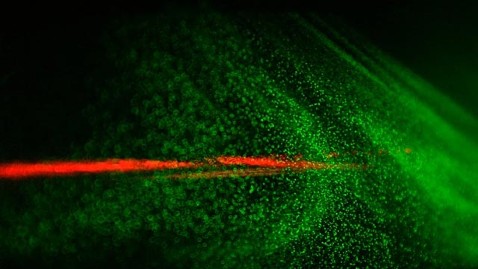The Rain Maker: Laser May Create Raindrops

Laser (red) creates particles (green) around which moisture can condense. Image credit: J.-P. Wolf / University of Geneva
If you live in a part of the northeast flooded by Hurricane Irene — or, for that matter, areas suffering drought — you can take some comfort that scientists are on the case.
A team at the University of Geneva reports it has found a way to make raindrops form in the air by using pulsed laser beams. It’ll still take a lot of work, but it may be better than cloud seeding, which worried farmers have tried for decades with mixed results.
The scientists, from Switzerland and Germany, used a mobile laser, which they fired into the air. They did not create droplets heavy enough to fall to the ground, but the heat of the laser did create particles of nitric acid, which could be natural rainmakers.
“The formation of small particles is a step, said Jerome Kasparian, one of the members of the team. “It might seed or enhance the precipitation.”
A quick explanation: moisture in the air does not naturally turn into raindrops unless there is enough of it, and there are particles around which droplets can coalesce. Usually, dust floating over our heads will do the trick.
But not always, and that’s why people have tried to intervene. It’s not great. Conventional cloud seeding involves spraying particles of silver iodide from planes — but it doesn’t always work, and silver iodide is classified as toxic. A laser could do the job much more benignly, if it could create droplets large enough.
“Laser filaments can induce water condensation and droplet growth up to several [micrometers] in diameter in the atmosphere as soon as the relative humidity exceeds 70 percent,” wrote the researchers in Nature Communications.
In other words, it already had to be moist for the experiment to work, but the scientists say they think they’re on to something.
“In some conditions, it can also prevent rain,” said Kasparian. “If many, many particles are in the air, they will all compete for the moisture there, and maybe none of them will become big enough to fall to the ground.”
And the laser has one other advantage, he said: “You can turn it on and off when you want.”